Reflections after meeting Didi Ma- By Mrittunjoy
There are some people who are vocal about their views, there are some who are firebrand, and then there is Sadhvi Ritambhara. Didi Maa, as she is popularly called, brings such intensity and aura to a discussion that it is tough not to describe her as the media may have over the years, as a speaker who can move the masses with her uninhibited speeches. What people often do not see is the compassion and spiritual energy of Didi Maa. Few, beyond her devotees, would know that Didi Maa is the founder of Vatsalyagram, a unique initiative that breaks away at what she calls the western constructs of orphanages, old-age homes and women rehabilitation centres, by creating a home and a welcoming environment for all the three to come together: each home at Vatsalyagram has one elderly ‘grandmother’, a ‘mother’ and some kids. The interesting bit? None of them are related by blood. When I myself saw the report on the things that the initiative has been doing, I was deeply moved. I have myself worked with Udayan Care in the past and the satisfaction one gets from honestly and sincerely pursuing this is truly otherworldly.
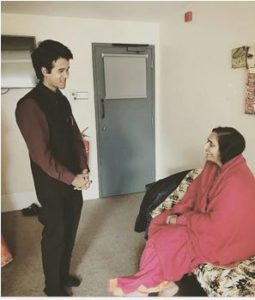
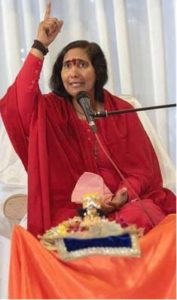
Before the Satsang on 11 August 2019 at Harrow, United Kingdom, I was taken by Harshaji, a Trustee of Param Shakti Peeth of U.K. to personally meet Sadhviji. A gentle smile, a calm face, playful and yet piercing eyes. After Harshaji, introduced me, we had a few minutes of interaction, and that was enough to see why she is the figure she is today, spiritually and socially. The conviction with which she spoke then and later, on things ranging from Hindu values to nationalism and society, was fascinating to watch. There were many points where there were moments of clarity and then there were moments of brevity. Her couplets and verses from the scriptures and Itihasa were a pleasure to listen to. What struck me most, however, is the key point that I have myself been interested in: decolonisation. Decolonisation not just of spaces and practices but of hearts and minds. Decolonisation of social systems and belief sets. The Indian subcontinent was invaded by foreign powers from Europe, Afghanistan and Central Asia for centuries. While the early stages saw either the subjugation of the indigenous people in various places or the assimilation of the invading cultures into the indigenous one, the later period saw a colonial exercise that fundamentally changed the fabric of society, and more importantly, the psyche of the people.
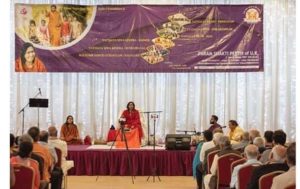
Didi Maa gave the specific example of education, and how the indigenous systems were much more organic for a child’s progression, starting with the nurturing by a mother to the ashram system. While one may argue that times have changed and subjects of study have progressed in leaps and bounds, the culture of collaboration and community learning is something that has not quite. In fact, that is what India presents to the world: a unique understanding of the role of the community. It is a relational reality that our sadhus and sages have spoken of, since times immemorial, and it is one that sees charity not as just a noble deed but much more than that. Charity and social work, for us, who are true followers of Sanatans (a) Dharma, is all about realizing that we are all One and we are, in essence, a part of Brahman that has manifested in various forms over the ages. I had a recent chat with someone who confused Brahman with Brahmin in a rather unnecessary debate on Brahminical systems when I had spoken of Brahman in a certain context, and so would like to highlight that Brahman is the ultimate oneness and unity that Sankara saw in his Advaitic view, Chaitanya Mahaprabhu saw in Krishna Consciousness and Ramakrishna Paramhansa (my ishta-guru) saw in his nirvikalpa samadhi. In my opinion, Dharma speaks of the duties and responsibilities of an individual that safekeeps the equilibrium within yourself, given your state-of-being, and without too, with respect to the society. Charity, in this context, arises from an identification of all beings and things as part of you, in essence. It is much more personalized, experienced and sincere, as a result. It is this great tradition that we come from, where charity is a Dharmakarya (Dharmic task) and not just a Punyakarya (task that accrues blessings). We have had an illustrious history of ideas, philosophies, people and traditions, and unfortunately, we have compromised on all. We have corrupted the understanding of Varna with a caste system. We have made our culture as confrontational and full of other-ing as those by various other countries. We have forgotten that this was the land where Yoga Vashishta and Tripura Rahasya were composed. We have forgotten that this was the land where Buddha and Mahavira walked. We have forgotten the exploits of the Mauryas, the Guptas, the Vardhans and so many others. And, most importantly, we seem to have forgotten that we have always had a most dynamic, accepting and organic system of belief and society. It is for this orientation, this alignment, that we must fight. It is not for just another belief or idea or concept, but the inherently liberal and intrinsically cosmopolitan tradition that we have had since the Vedic times. Being Hindu is not about just a religion or even a place, going against the civilizational aspect of this as well. It is about an idea. An idea of being. An idea of life. A way of life that is so accommodating that philosophies as disparate as those of the Carvakas and Sunyata-vadi Buddhists can co-exist with theistic schools and Abrahamic religions, where kings and governments have come and gone, but the society has not only survived but emerged all the richer from the experience. It is this tradition, it is this culture, we must stand for. It is for the idea of humanity itself, in line with the workings of the cosmos, that we stand for. As Bharatiya, as Indian. And it is this that Didi Maa stands for, and I so easily and beautifully relate to, and align with. It is with pride that I say that I am Indian and I am happy that my father did not settle in the United States where I was born. For, even though I may have attained materially then, I would definitely have been deprived of a social and spiritual heritage that makes me who I am.
 Mrittunjoy Guha Majumdar is a youth-scientist, student leader, poet, writer, social thinker and activist.
Mrittunjoy Guha Majumdar is a youth-scientist, student leader, poet, writer, social thinker and activist.

Readers like you, make ESHADOOT work possible. We need your support to deliver quality and positive news about India and Indian diaspora - and to keep it open for everyone. Your support is essential to continue our efforts. Every contribution, however big or small, is so valuable for our future.

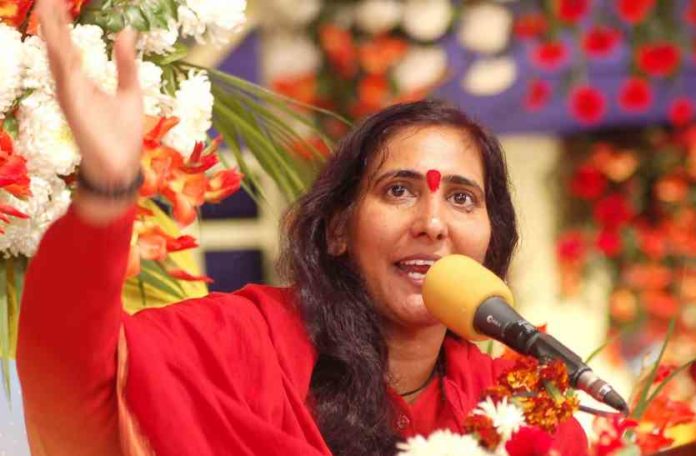



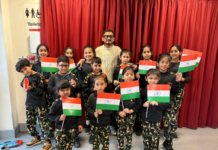
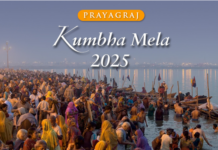
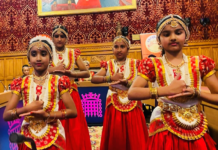




Though invoking report and analysis and Didi Maa’s visit and yes more archaeological finds prove that ours is really greatest of cultures and after all the horrific invasions conversions and sujugations Hinduism lives todate